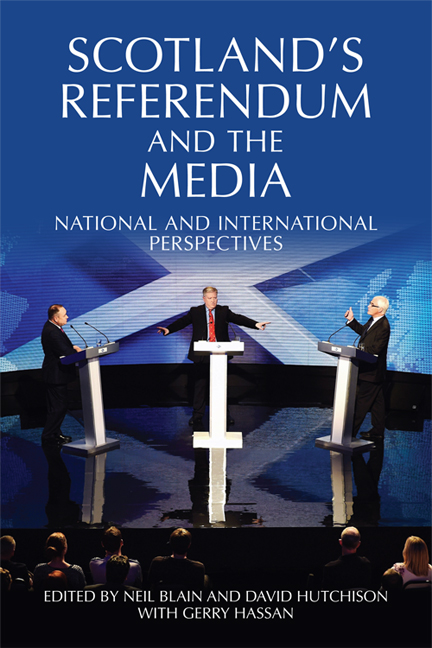Preface
Published online by Cambridge University Press: 05 August 2016
Summary
There can be no doubt that the Scottish referendum of 2014 was a unique event in the history of both Scotland and the United Kingdom. There have been referendums before in both polities but this was the first one which could have led to the dissolution of the UK. Furthermore, as we note in an Afterword which traces events until the UK general election in May 2015, the referendum result offered no resolution to the constitutional wrangling it was designed to end.
In any contemporary public debate the media are central in facilitating, and to a degree constructing, the discussion, although what was most striking in the run-up to September 2014 was the extent to which the citizens of the country were galvanised into participation through meetings, rallies and canvassing. The final turnout of 85 per cent is testimony to a level of involvement never seen in any of the previous referendums, or indeed elections, since 1945.
Inevitably the performance of the media themselves became a subject for debate in the media, particularly online, and that debate intensified after allegations were made that the Better Together campaign had privately re-christened itself ‘Project Fear’.
The implications of the vote, whatever way it went, were bound to reverberate beyond Scotland, most obviously in the other nations which make up the United Kingdom, Wales, Northern Ireland and England. But there were also implications for the European Union, which could have found itself confronting a challenging situation as one of its member states ceased to exist. And in at least two constituent states of the EU, the Scottish result was watched with considerable interest by groups which seek increased autonomy or independence from their existing states. Likewise, there are several countries in the world where there are large Scottish diasporas with more than a passing interest in the future trajectory of their ancestral home.
In putting this collection of essays together we sought out contributors we believed would have insightful comment to offer not only on how the media in their own parts of the world represented what was happening in Scotland, but also on what that might tell us about both these media, and the polities of which they are a part.
- Type
- Chapter
- Information
- Scotland's Referendum and the MediaNational and International Perspectives, pp. vii - xPublisher: Edinburgh University PressPrint publication year: 2016



